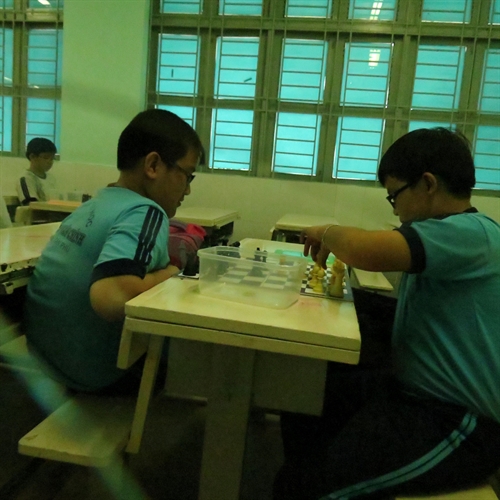 Society
Society

The Department of Education plans to ask the city to issue detailed regulations on private services for students who must attend school in either a morning or afternoon shift.
 |
| Fifth-grader Hà Đức Bình of Huỳnh Văn Chính Primary School (lelf)plays chess with a schoolmate at Ruby School, which operates a private service for students in HCM City who cannot attend public school all day because of a classroom shortage. VNSPhoto Gia Lộc |
Gia Lộc
HCM CITY — The Department of Education plans to ask the city to issue detailed regulations on private services for students who must attend school in either a morning or afternoon shift.
The department wants to ensure that services and facilities offered by individual providers are safe for children, including food and facilities.
Some public schools, particularly those with rising numbers of students from increased migration from the provinces, do not have enough classrooms for both morning and afternoon classes. They also cannot provide lunch.
Because of the shortage, many parents, who are often busy at work all day, often have to make arrangements with private services provided by individuals located near the students’ schools, according to Nguyễn Hồng Hà, deputy head of the Culture and Social Affairs Board under the People’s Council.
The students who cannot attend both morning and afternoon sessions often go to a private school for either a morning or afternoon session.
The private services include only lunch and extracurricular activities such as English. Some students receive extra academic instruction.
Nguyễn Quang Vinh, head of the city’s Department of Education and Training’s primary education division, said that in the 2015-2016 academic year, the pressure of compulsory primary education and rising number of children of migrants in the city had led to insufficient classroom space.
The districts with rapidly growing numbers of children of migrants from other provinces are Bình Tân, Tân Phú, Gò Vấp, 12 and Hóc Môn.
The private service providers sometimes pick up the children from public schools. But at other times, they do not so the children must walk there, which usually are located in someone’s home.
A mother of a first grader from Gò Vấp District said her son studies at An Hội Primary School in the morning and then goes to Thần Đồng Establishment in the afternoon.
“We could not pick up and take care of him at home as we are busy. So, we have to pay VNĐ700,000 ($31) per month for the private service,” she said.
Her son must cross a road and walk to the Thần Đồng Establishment after the morning shift at An Hội School.
In the last few years, in Gò Vấp District, the public primary schools met only 50 per cent of the people’s demand for full-day attendance.
With such a need, the number of private services establishments located near public schools in the district has risen to seven, with more than a total of 770 children.
Tân Phú District’s schools also have reduced the rate of students who attend all day, though the demand remains high. Each year, the district schools see an increase in 7,200 first-graders.
In the last two years, the rate of all-day students in the district was only 24-25 per cent, the lowest proportion in the city.
It is expected to rise to 35 per cent by 2020, said Tạ Tân, head of the district’s educational division at recent meeting with the Culture and Social Affairs Board of the city People’s Council.
To meet the remaining 65 per cent, three private establishments have been opened however they can receive about 500 students.
Besides the individual providers, private schools that are licensed offer lunch and extracurricular sessions for public school students who cannot attend school all day.
Trần Thị Nga, principal of the privately licensed Ruby School, said the school received students from public primary schools, including Phan Chu Trinh, Huỳnh Văn Chính, Hồ Văn Cường and Duy Tân at prices between VNĐ1.5 million and VNĐ1.7 million.
The number doubled from 80 in the 2013-2014 academic year to 163 in the 2015-2016 year.
Trương Nguyễn Hải Yên, a third-grader at Phan Chu Trinh Primary School in Tân Phú District, attends Ruby School in the morning.
Yên’s parents are busy at work and have two other children, so they cannot pick her up at public school or tutor her at home.
Yên is picked up at Phan Chu Trinh Primary School by the Ruby School.
“I like going to school rather than staying at home in the morning because I have friends to play with,” Yên said.
Better management
Because many of the private service individual providers may pose risks, the city’s Culture and Social Affairs Board under the People’s Council has told the educational department to closely monitor these establishments.
Cao Thanh Bình, member of the Culture and Social Affair Board, said the department should petition the city People’s Committee to have detailed regulations on how these establishments should be managed.
Problems can arise from a shortage of regulations related to management, he added.
Nguyễn Văn Hiếu, the department’s deputy head, said the department had encouraged more private schools with empty classrooms to work with public schools that have a shortage of classrooms.
He said that parents would then have more options. — VNS




